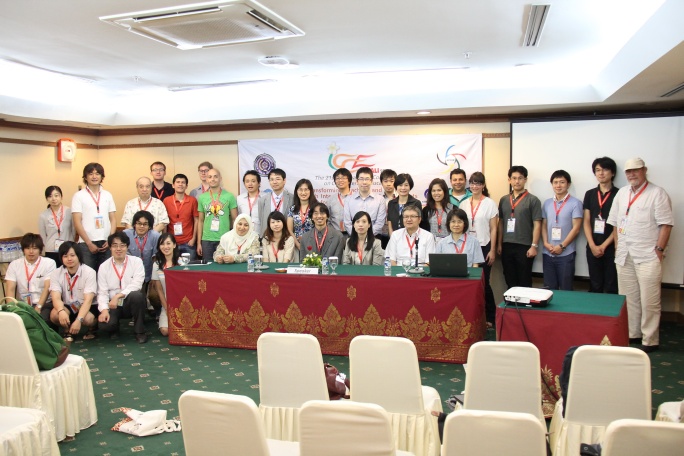The 6th Workshop on Modeling, Management and Generation of Problems/Questions in Technology-Enhanced Learning
at ICCE 2013 in Bali, Indonesia, on November 18, 2013.
Conference website: http://icce2013bali.org/
The 6th Workshop on Modeling, Management and Generation of Problems/Questions in Technology-Enhanced Learning was successfully held. Thank you for your participation!
Solving problems/questions is one of the most indispensable and important components in the teaching and learning process. Problems/questions with adequate quality in various testing conditions are believed to enable teachers to assess individual students' capability and readiness of transfer in specific domain knowledge. Despite this, there are still many areas in need of systematic investigation to promote knowledge and skills on problems/questions-centered learning approach, including learning by problem solving and/or generation. For instance: what criteria constitute as adequate test item quality (in addition to frequently cited psychometric index like item difficulty, discrimination index); how to best assess learner's capability with appropriate quality level within constrains (e.g., an optimal number of items, time limitation, etc.); any feasible metadata heuristics and/or techniques for problems/questions selection; any promising alternative strategies for compiling a sufficient amount of number of problems/questions; any scaffolding techniques for question-generation implementation and instructional diffusion and so on.
In ICCE2006 and 2007, 2009, 2010, and 2011, we held a series of workshops where we paid special attention to "questions/problems" in technology-enhanced learning. This is the 6th workshop focusing on the same topic. This continuous workshop will provide a good and timely opportunity to present and share the results and issues about "problems/questions" in ICCE community. We cordially invite presenters and participants who are interested in further exploring the many facets and potential uses of "problems/questions" in education/learning from a technological, computational, pedagogical, psychometrics, theoretical, sociological and administrative point of views. We are also planning to propose a special issue on "technology-based problem-posing" for Research and Practice for Technology Enhanced Learning (RPTEL) based on this workshop.
All workshop participants are required to register for the main conference, but there will not be additional workshop fee.
Style of Workshop:
Mini-conference with paper presentations
Topics of interest include, but not limited to:
- Problem/question generation/authoring/posing
- Learning by problem/question-posing
- Problem/question variation/changing
- Problem analysis and evaluation
- Structurization of domain knowledge
- Problem/question selection
- Metadata or Ontology of problems
- Metacognition in problem-solving or problem-posing
- Test theory
- Instructional intervention for problem/question-authoring in classrooms
Workshop Program
| 9:00-9:30 | Sign-In & Equipment Hook-up |
|---|---|
| 9:30-9:40 | Opening speech |
| 9:40-10:30 | Session (I) |
| Adaptive Question Generation for Student Modeling in Probabilistic Domains | |
| Nabila Khodeir, Nayer Wanas | |
| Facilitating Creative Cognition by Embodied Conversational Agents | |
| Yugo Hayashi | |
| 10:40-11:40 | Session (II) |
| How to Construct an Assessment System for Engineering Courses | |
| Yuhur Chou, Hsin-Yih Shyu | |
| Preliminary Assessment of Online Student-Generated Tests for Learning | |
| Fu-Yun Yu | |
| Empirical Study on Errors of Mathematical Word Problems Posed by Learners | |
| Kazuaki Kojima, Kazuhisa Miwa, Tatsunori Matsui | |
| The Design Principles of the Worked-Example and Its Effect | |
| Chun-Ping Wu, Pi-Han Lo | |
| 11:40-11:50 | Closing speech |
Presentation Instructions
- For Full Paper presentation, 20 minutes will be allocated for presentation and 5 minutes for discussion. Please keep the presentation within the time limit set.
- For Short Paper presentation, 10 minutes will be allocated for presentation and 5 minutes for discussion. Please keep the presentation within the time limit set.
- Please check in with your session chair before the session in which you are presenting begins.
- Please set up and test your presentation in the designated room prior to your session.
- A desktop computer connected to a projector will be provided at the room for your presentation. However, if you prefer to use a Mac computer, you will need to bring your own.
Workshop Organizers
- Tsukasa Hirashima (Hiroshima University)
- Tomoko Kojiri (Kansai University)
- Kazuaki Kojima (Teikyo University)
- Tanja Mitrovic (University of Canterbury)
- Fu-Yun Yu (National Cheng Kung University)
PC Members
- Sergei Abramovich (State University of New York)
- Yuske Hayashi (Hiroshima University)
- Tomoo Inoue (University of Tsukuba)
- Tatsuhiro Konishi (Shizuoka University)
- Hidenobu Kunichika (Kyusyu Institute of Technology)
- Yu-Feng Lan (National Formosa University)
- Nguyen-Thinh Le (University of Clausthal)
- Kazuhisa Seta (Osaka Prefecture University)
- Takahito Tomoto (Tokyo University of Science)
- Chun-Ping Wu (Tamkang University)
